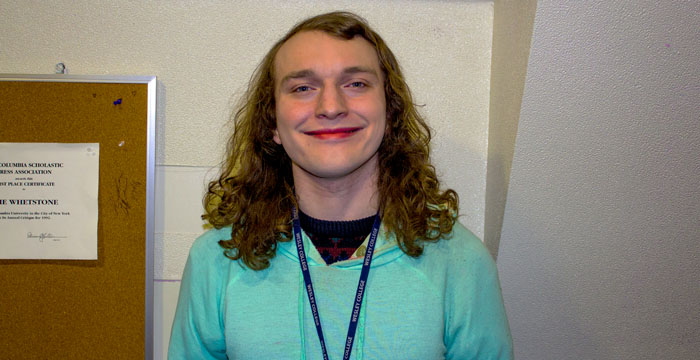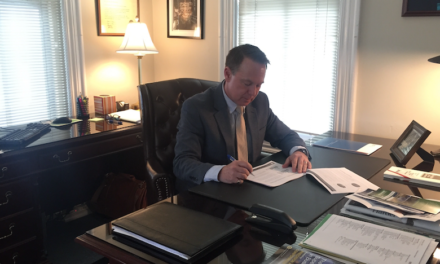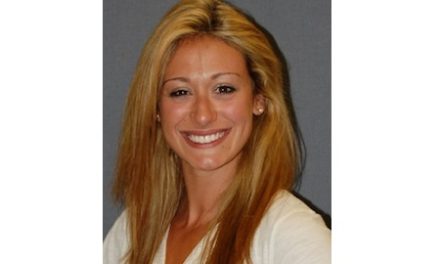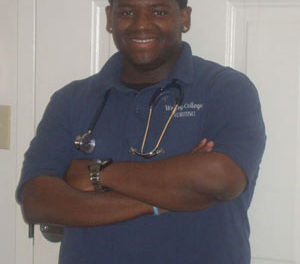By: Najya Beatty-McLean
She opened the door to her apartment on campus wearing a baggy T-shirt, loose jeans, sneakers and a baseball cap.
Her long blonde hair came out of the hat and her voice softened as she introduced herself. “I am Sydney Jacobs.†Before this semester, many Wesley students knew her as senior Jake Bradner.
At her graduation in May 2017, Jacobs will be the first transgender student to receive a degree from Wesley College.
“I haven’t always identified as a female,†she said. “It wasn’t until I came to college that I started to realize I identified as a female.â€
Jacobs said she started to accept who she was during her freshman year at Wesley.
“I was in the play ‘Hairspray’ here on campus my freshman year,†she said. “I felt really comfortable playing a woman. When I put on the dress and makeup, I felt like I was truly myself and all this confusion I had in my head is really who I am.â€
She said she has always felt this way but could never explain why.
“I just know deep down in my heart and my soul, I was never meant to be a man,†she said. “I should’ve been born a woman.â€
The campus’ reaction to her coming out has been positive, she said. But in previous semesters, the consequences of coming out had been one of her greatest fears.
The struggle of hiding behind a mask took a huge toll on Jacobs. She said she was filled with hate and disgust for herself.
“I hate shaving my face,†she said. “I hate the stubbles on my face. More than anything, I hate my voice because it sounds more masculine than feminine.â€
She was bothered by the role she had to play around everyone because no one knew the person she was behind her “Jake mask.â€
“I basically put on a mask in front of everyone, showing them who they think I am,†she said. “That’s not fair to me.â€
She had been nervous about the change last semester.
“I am most afraid of heartbreak when it comes to coming out to everyone,†she had said. “I am afraid that people will be scared of me. I hate it but that’s just the way it is.â€
On campus before this semester, Jacobs said she felt like she had to wear the mask because she didn’t want to confuse everyone.
“I think for some people on campus, me coming out might be tough,†she said. “My classmates, professors and everyone else have seen me a certain way for four years.â€
Jacobs said she has one good friend on campus, her roommate, senior Kenneth Young.
“Sydney and I have been friends since freshman year and roommates since sophomore year,†Young said. “When she told me she was bisexual, she thought I would freak out or something. But I didn’t, I don’t look at her any differently.â€
Young described Jacobs as unique – but not different than anyone else.
“When it comes to things like music, film, and especially politics, she is very meticulous,†he said. “She enjoys befriending people and making jokes.â€
Young said he doesn’t think Jacobs’ sexuality factors into their friendship.
“Knowing what I know hasn’t changed anything, I just let (her) be,†he said.
Having support is something Jacobs wanted badly, but she didn’t know how much support she would actually have when she came out.
“I saw (her) at the mall in a dress,†classmate DaJahn Lowery said. “I really didn’t pay it any attention because that’s (her) life and (she) can do what (she) wants with it.â€
Now that she has come out, Jacobs said she worries about life after college the most.
“I mainly worry about jobs,†she said. “I feel like people could still fire you and not necessarily tell you the reason, and I feel like that’s not fair.â€
Jacobs points to his 3.45 GPA.
“To do all that hard work and have them deny you, it sucks,†she said.
In an email sent to Jacobs’ professors at the beginning of the semester, Title IX Coordinator Renee McGlothlin quoted Cooper Lee Bombardier to help explain the transition from Jake Bradner to Sydney Jacobs.
“It isn’t about ‘becoming’ another person—I already am who I am—I just want my body to reflect that,†the email said. “It’s not like I’m suddenly changing from the person you’ve always known—this is more about your willingness to see who I’ve always been.”
Co-Editor-in-Chief Brittany Wilson contributed to this article.





